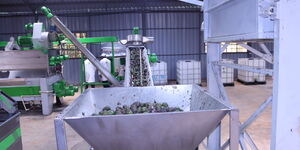The government has ordered the nationwide closure of all businesses selling uninspected meat as part of heightened public health surveillance ahead of the festive season.
Public Health and Professional Standards Principal Secretary Mary Muthoni directed all public health officers to immediately shut down butcheries that bypass official meat inspections, warning that such practices endanger the lives of Kenyans.
“I want to ask all public health officers to go and close all the butcheries that are selling uninspected meat. We have put all other important procedures in place, including our ports, where no one is allowed to come in uninspected,” Muthoni stated.
Speaking in Nairobi, the PS cautioned that the weeks leading up to Christmas often see increased slaughtering of animals for family gatherings, creating opportunities for unsafe and uninspected meat to enter the market.
Muthoni added that the Ministry of Health is collaborating with county governments, where most inspection officers are based, to intensify surveillance and crack down on unlicensed meat sellers.
She also issued a stern warning to inspection officers found colluding with traders to overlook proper meat inspections, noting that such cases would attract disciplinary and legal action.
Compliance
According to the government, as part of procedures to ensure public safety, all butcheries across the country must ensure that every animal intended for slaughter undergoes an ante-mortem inspection by a certified veterinary or public health officer.
After slaughter, the carcasses must undergo a post-mortem inspection, after which an official stamp of approval is issued to confirm that the meat is fit for human consumption, with consumers encouraged to check if they can spot the same in their outlets.
Additionally, butcheries are required to hold valid operating licences issued by county public health departments and maintain records of their meat suppliers.
The government has also set strict guidelines on storage, requiring that meat be kept in clean, refrigerated facilities that meet hygiene standards outlined in the Public Health Act.
Transportation of meat will be equally regulated, with all consignments expected to be sealed and accompanied by movement permits from approved slaughterhouses, to ensure that no contaminated or unlawfully slaughtered meat enters the market.
Consuming uninspected meat poses serious health risks, including the transmission of zoonotic diseases such as anthrax, brucellosis, and Rift Valley Fever. In addition, unregulated slaughtering can lead to chemical contamination from medicine or pesticides used on animals.












